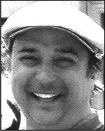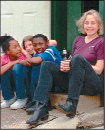Baltimore Noir (24 page)

Now Ivan was asleep and Jeannie stood in the hallway, listening to the sounds of the guests below and thinking about where to go. She found herself stopping in the bedroom, opening up Charlie’s safe, and tucking the Beretta into one of the deep pockets camouflaged in the side seams of her dress. Now her dress was slightly weighed down on the right, but nobody would notice, given that downstairs was dimly lit by candles. She was going to give Hodder the scare of his life, frighten him so badly that he’d ruin his Ralph Lauren khakis for good—
“Jeannie, aren’t you done yet?” Charlie’s voice came up from the landing.
“Sorry, darling,” Jeannie said as she descended the curving stairway.
“Your dress is lovely. It reminds me of the New Look,” Hortense said, fingering the black silk-satin. Jeannie thanked her for the compliment, and peeked her head into the front parlor. Sister Natalie sat before a round table draped in red silk. The psychic’s deeply wrinkled face appeared solemn, illuminated by candlelight. Her troubled eyes locked with Jeannie’s.
“How are you, Sister Natalie?” Jeannie asked with false cheer, looking away from the psychic’s hooded stare.
“I don’t like this,” Sister Natalie said in a rumble that sounded like a bad storm coming in.
“You mean the table’s not right, or—” Jeannie cut herself off when she heard the sound of Ivanhoe’s voice. She had closed his door, but even through the wood she could hear that he was crying.
“He sounds scared,” Hodder said. “Why don’t you bring him down to join us?”
“No can do,” Charlie said. “Little guy probably had a bad dream. He’s got to learn to settle himself down again.”
“Children need discipline,” Hortense agreed. “Only people can’t say that word anymore. What’s the word that you young parents favor—limits? Come, let’s limit the time that’s ticking and seat ourselves in the parlor. Sister Natalie has been waiting so patiently for the spirits to come, I’m sure they’re all present and ready to show us a very good time.”
“Hmm. Maybe Jeannie wants to go upstairs to see what’s going on.” Hodder’s eyes gleamed, and Jeannie knew, all of a sudden, what her agent wanted. He wanted her to be the one to see the hologram of the boy, to be spooked enough to beg Charlie to sell the house immediately.
“I think Charlie’s right,” Jeannie said, going against every instinct in her body. “I’ll wait a couple of minutes to see if he settles down. Now, does anybody need a second drink or—”
The sound of breaking glass cut through her last words, followed by a thud.
“You bastard!” Jeannie looked straight at Hodder. He’d pulled a new trick out of his hat, just for the evening.
She looked at Charlie for support, but her husband was loping up the stairs, two at a time. The door to Ivanhoe’s room banged open and then she heard Charlie cry: “My God, Ivanhoe—the window!”
Thank heaven for the battlements, everyone said later. The big, pretentious, sturdy stucco battlement which supported the Maryland flag was the spot where Ivanhoe had landed a mere eighteen inches under his bedroom window. The boy had enough cuts to require thirty stitches at GBMC, but the plastic surgeon assured them that scarring was unlikely.
Other scars were a different matter. Even though Hodder began burbling out apologies, rapidly, when faced with the long end of the Beretta, Jeannie had been on the verge of doing something unthinkable, but Hortense had managed to gently detangle her shaking fingers from the weapon. Hodder fled the house without so much as a goodbye. Hortense made Jeannie sit down and drink whiskey, and Walter, the new guy at Charlie’s company, paid off the rest of Sister Natalie’s fee plus a thousand in keep-quiet money. All the while, Charlie cradled his small bloody son in his arms, crying softly alongside him as they all waited for the ambulance to arrive.
Charlie wanted to have Hodder arrested on charges of attempted manslaughter, but their lawyers said the best they could do was charge him with trespassing and possibly wiretapping. It took a good year for the case to come to trial in Baltimore’s beleaguered courts. Hodder ultimately received a three-month sentence that his lawyer managed to have converted into community service.
While Hodder picked up discarded soda cans along the Stony Run, Hortense Underwood used the phones to ensure his name was even muddier than the creek’s bottom. The preppy real estate agent no longer had a job at the Mount Company, nor would Coldwell Banker, the Hill Company, Long and Foster, nor any of the other big firms in the city, hire him. In fact, the agent who ultimately sold 100 Goodwood Gardens that winter was Hortense’s daughter-inlaw, the only one who agreed to the couple’s desired asking price—ten percent below what they’d paid the earlier year.

RAFAEL ALVAREZ
is the son of a Baltimore tugboat engineer. The author of numerous “Orlo & Leini” tales, Alvarez published a people’s history of the Archdiocese of Baltimore in 2005.

JACK BLUDIS
is a lifetime resident of the Baltimore area who lived his early years in Pigtown. He was a finalist for both the Shamus and Anthony Awards for Best Short Story in 2004, His novel
Shadow of the Dahli
was a Shamus Award finalist in 2005.

TIM COCKEY
spent his wonder years in Baltimore, living in the Cockeysville, Garrison Forest, and Roland Park neighborhoods. He has published five novels featuring Fell’s Point undertaker Hitchcock Sewell—the infamous “Hearse” books. He now lives in New York City.

DAN FESPERMAN
has lived in Baltimore for more than twenty years, with detours to Berlin and other points abroad as a foreign correspondent for the
Baltimore Sun
. He is the author of
The Warlord ’s Son
and three other novels, two of which have won Dagger Awards from the British Crime Writers Association.

LISA RESPERS FRANCE
is a native “Baltimoron” who owes her love of the written word to her parents, Gary and Patricia, for tirelessly shuttling her back and forth to the Enoch Pratt and Baltimore County public libraries during her early years. A former reporter at the
Los Angeles Times
and the
Baltimore Sun,
she is currently a writer and editor in New York City and can often be found hauling a cooler filled with Maryland crab meat up Interstate 95.

JIM FUSILLI
is the author of the award-winning Terry Orr series, which includes
Hard, Hard City
, winner of the Gumshoe Award for Best Novel of 2004, as well as
Closing Time, A Well-Known Secret,
and
Tribeca Blues.
He also writes for the
Wall Street Journal
and is a contributor to National Public Radio’s
All Things Considered.

ROB HIAASEN
is a native Floridian who moved to Baltimore in 1993 to become a staff writer for the
Sun
When hungry for stories or mussel chowder, Hiaasen drifts into Fell’s Point, which may or may not have an apostrophe.

LAURA LIPPMAN
has lived in Baltimore most of her life and she would have spent even more time here if the editors of the
Sun
had agreed to hire her earlier. She attended public schools and has lived in several of the city’s distinctive neighborhoods, including Dickeyville, Tuscany-Canterbury, Evergreen, and South Federal Hill. She is the author of ten books, including the Baltimore-centric Tess Monaghan novels.

SUJATA MASSEY
graduated from Johns Hopkins University and worked as a reporter at the late but great
Baltimore Evening Sun
before turning to a life of crime fiction. She is the author of nine novels, most recently
The Typhoon Lover
She enjoys living in Roland Park, though she has pledged never to take up gardening or drive a Humvee.

BEN NEIHART
lived in the “landmark” Marylander apartment building in the Charles Village neighborhood of Baltimore for three years during the mid-1990s. He is the author of the books
Hey Joe, Burning Girl,
and
Rough Amusements
and his work has appeared in the
New York Times Magazine,
the
New Yorker, Travel & Leisure,
and the
Baltimore Sun
. He currently lives in New York.
